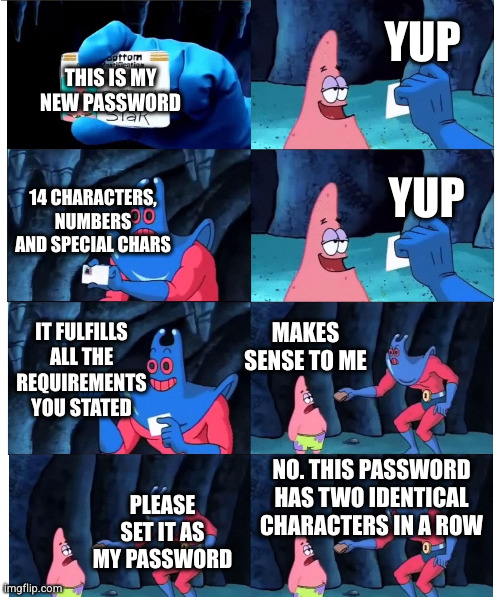this post was submitted on 25 Aug 2024
556 points (98.4% liked)
Cybersecurity - Memes
1995 readers
1 users here now
Only the hottest memes in Cybersecurity
founded 1 year ago
MODERATORS
you are viewing a single comment's thread
view the rest of the comments
view the rest of the comments

As a website developer, it’s easy to just use the 'maxlength' attribute on fields you don’t want to exceed a certain length (for valid reasons or not). But then exactly this happens: A user pastes something in there, doesn’t notice that their input got truncated, and something, somewhere breaks.
'maxlength' is terrible user experience.
Yeah, thinking about it now, I could've probably tried removing the maxlength attribute to see if the server accepts the longer password.
That doesn't sound like it should work, but probably would..
That wouldn't have been (as much of) a problem if the initial password form also truncated the input. The mismatch is the problem.
Let’s say “you wouldn’t have noticed there was a problem if there was no mismatch”. But then a few years later that max length gets dropped or increased and suddenly your password, which has always worked, isn’t accepted anymore, because now you’re pasting 2 extra characters.
I was also not talking about password fields, exclusively. Pasting stuff like customer identifiers or zipcodes into maxlength’d fields also begs for surprises, especially when you can’t see the whole input when you’re done with it.
I understand why stored information, such as passwords, usernames, stuff like that, has to have a max character count.
What I don't get is why so many people are so daft as to let stuff like this happen, and not even put the maximum password length anywhere people can obviously see it.
If you tell me what the maximum limit is, I'll be able to keep my password shorter than that.
But no.... Password minimum length is shown, symbols, numbers and special character requirements are plainly stated. Maximums? Ha.